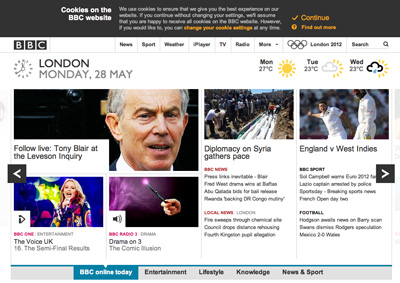As the ICO’s 1 year amnesty on enforcement ended on 26 May 2012, 4 major UK media websites launched different solutions to comply with the directive.
Background
The Privacy and Electronic Communications (EC Directive) (Amendment) Regulations 2011 was passed on 26th May 2011. Known more commonly as the ‘EU cookie law’, it is now a legal requirement for website owners to obtain the consent of users before ‘placing or reading cookies’ on their browsers.
In simple terms the Directive:
- is about information stored on users’ computers, which is not limited to cookies alone
- requires visitors to opt-in (rather than opt-out) to receive cookies
- recognises that as not all cookies are the same the level of opt-in depends on whether they are ‘strictly necessary’ to the technical operation of the website
In view of the difficulties in achieving compliance, the Government asked the Regulator (Information Commissioner) to delay enforcement for 12 months.
What are major UK websites doing to comply?
The enforcement delay ended on 26th May 2012 and 4 major UK media owners (BBC; Channel 4; Guardian; Telegraph) modified their websites last week as reported in more detail in an e-consultancy post
The BBC has incorporated a status bar at the top of the page with a clear message advising the site uses cookies with a link to change cookie settings but consent is implied. It also includes a page placing cookies into 4 groups:
- strictly necessary – to move about the site or provide certain requested features
- functionality – enhance functionality by storing personal preferences e.g. your location for BBC weather
- performance – help improve the website performance e.g. analytics
- online behavioural advertising cookies – used to tailor the advertising to each user on the international version of the website
- third party cookies – to embed content from sites like YouTube or to use a Share Button
The Channel 4 also uses a prominent status bar but requests customers to click to accept and close the status bar. Unlike the BBC, users can’t set their preference but have a link to help pages showing how to change their browser settings.
The Guardian & Telegraph also use cookie message status bars. They are also at the top of the page but less prominent than the BBC & Channel 4.


